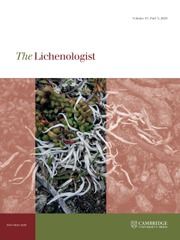Crossref Citations
This article has been cited by the following publications. This list is generated based on data provided by Crossref.
Egan, Robert S.
2010.
Recent literature on lichens—218.
The Bryologist,
Vol. 113,
Issue. 3,
p.
690.
Joshi, Santosh
Jayalal, Udeni
Oh, Soon-Ok
Nguyen, Thi Thuy
Dzung, Nguyen Anh
and
Hur, Jae-Seoun
2013.
The lichen genus Graphis from Vietnam.
Mycotaxon,
Vol. 125,
Issue. 1,
p.
69.
Seavey, Frederick
Seavey, Jean
Hernández M., Jesus E.
and
Lücking, Robert
2014.
Three newOpegraphaspecies (Roccellaceae, Arthoniales) and several additions to the North American lichen mycota from Everglades National Park.
The Bryologist,
Vol. 117,
Issue. 1,
p.
62.
Joshi, Santosh
Upreti, Dalip Kumar
Nguyen, Thi Thuy
Nguyen, Anh Dong
Oh, Soon-Ok
and
Hur, Jae-Seoun
2015.
A New Species ofFissurinaand New Records ofGraphidaceaefrom Vietnam.
Cryptogamie, Mycologie,
Vol. 36,
Issue. 4,
p.
383.
Lücking, Robert
Mangold, Armin
and
Lumbsch, H. Thorsten
2016.
A Worldwide Key to Species of the GeneraMyriotremaandGlaucotrema(Lichenized Ascomycota: Graphidaceae), with a Nomenclatural Checklist of Species Published inMyriotrema.
Herzogia,
Vol. 29,
Issue. 2,
p.
493.
Ekanayaka, A. H.
Ariyawansa, H. A.
Hyde, K. D.
Jones, E. B. G.
Daranagama, D. A.
Phillips, A. J. L.
Hongsanan, S.
Jayasiri, S. C.
and
Zhao, Qi
2017.
DISCOMYCETES: the apothecial representatives of the phylum Ascomycota.
Fungal Diversity,
Vol. 87,
Issue. 1,
p.
237.
Wijayawardene, Nalin N.
Hyde, Kevin D.
Rajeshkumar, Kunhiraman C.
Hawksworth, David L.
Madrid, Hugo
Kirk, Paul M.
Braun, Uwe
Singh, Rajshree V.
Crous, Pedro W.
Kukwa, Martin
Lücking, Robert
Kurtzman, Cletus P.
Yurkov, Andrey
Haelewaters, Danny
Aptroot, André
Lumbsch, H. Thorsten
Timdal, Einar
Ertz, Damien
Etayo, Javier
Phillips, Alan J. L.
Groenewald, Johannes Z.
Papizadeh, Moslem
Selbmann, Laura
Dayarathne, Monika C.
Weerakoon, Gothamie
Jones, E. B. Gareth
Suetrong, Satinee
Tian, Qing
Castañeda-Ruiz, Rafael F.
Bahkali, Ali H.
Pang, Ka-Lai
Tanaka, Kazuaki
Dai, Dong Qin
Sakayaroj, Jariya
Hujslová, Martina
Lombard, Lorenzo
Shenoy, Belle D.
Suija, Ave
Maharachchikumbura, Sajeewa S. N.
Thambugala, Kasun M.
Wanasinghe, Dhanushka N.
Sharma, Bharati O.
Gaikwad, Subhash
Pandit, Gargee
Zucconi, Laura
Onofri, Silvano
Egidi, Eleonora
Raja, Huzefa A.
Kodsueb, Rampai
Cáceres, Marcela E. S.
Pérez-Ortega, Sergio
Fiuza, Patrícia O.
Monteiro, Josiane Santana
Vasilyeva, Larissa N.
Shivas, Roger G.
Prieto, Maria
Wedin, Mats
Olariaga, Ibai
Lateef, Adebola Azeez
Agrawal, Yamini
Fazeli, Seyed Abolhassan Shahzadeh
Amoozegar, Mohammad Ali
Zhao, Guo Zhu
Pfliegler, Walter P.
Sharma, Gunjan
Oset, Magdalena
Abdel-Wahab, Mohamed A.
Takamatsu, Susumu
Bensch, Konstanze
de Silva, Nimali Indeewari
De Kesel, André
Karunarathna, Anuruddha
Boonmee, Saranyaphat
Pfister, Donald H.
Lu, Yong-Zhong
Luo, Zong-Long
Boonyuen, Nattawut
Daranagama, Dinushani A.
Senanayake, Indunil C.
Jayasiri, Subashini C.
Samarakoon, Milan C.
Zeng, Xiang-Yu
Doilom, Mingkwan
Quijada, Luis
Rampadarath, Sillma
Heredia, Gabriela
Dissanayake, Asha J.
Jayawardana, Ruvishika S.
Perera, Rekhani H.
Tang, Li Zhou
Phukhamsakda, Chayanard
Hernández-Restrepo, Margarita
Ma, Xiaoya
Tibpromma, Saowaluck
Gusmao, Luis F. P.
Weerahewa, Darshani
and
Karunarathna, Samantha C.
2017.
Notes for genera: Ascomycota.
Fungal Diversity,
Vol. 86,
Issue. 1,
p.
1.
Lücking, Robert
Hodkinson, Brendan P.
and
Leavitt, Steven D.
2017.
The 2016 classification of lichenized fungi in the Ascomycota and Basidiomycota – Approaching one thousand genera.
The Bryologist,
Vol. 119,
Issue. 4,
p.
361.
Hyde, Kevin D.
Tennakoon, Danushka S.
Jeewon, Rajesh
Bhat, D. Jayarama
Maharachchikumbura, Sajeewa S. N.
Rossi, Walter
Leonardi, Marco
Lee, Hyang Burm
Mun, Hye Yeon
Houbraken, Jos
Nguyen, Thuong T. T.
Jeon, Sun Jeong
Frisvad, Jens Christian
Wanasinghe, Dhanushka N.
Lücking, Robert
Aptroot, André
Cáceres, Marcela E. S.
Karunarathna, Samantha C.
Hongsanan, Sinang
Phookamsak, Rungtiwa
de Silva, Nimali I.
Thambugala, Kasun M.
Jayawardena, Ruvishika S.
Senanayake, Indunil C.
Boonmee, Saranyaphat
Chen, Jie
Luo, Zong-Long
Phukhamsakda, Chayanard
Pereira, Olinto L.
Abreu, Vanessa P.
Rosado, André Wilson Campos
Bart, Buyck
Randrianjohany, Emile
Hofstetter, Valérie
Gibertoni, Tatiana B.
Soares, Adriene Mayra da Silva
Plautz, Helio Longoni
Sotão, Helen Maria Pontes
Xavier, William Kalhy Silva
Bezerra, Jadson Diogo Pereira
de Oliveira, Thays Gabrielle Lins
de Souza-Motta, Cristina Maria
Magalhães, Oliane Maria Correia
Bundhun, Digvijayini
Harishchandra, Dulanjalee
Manawasinghe, Ishara S.
Dong, Wei
Zhang, Sheng-Nan
Bao, Dan-Feng
Samarakoon, Milan C.
Pem, Dhandevi
Karunarathna, Anuruddha
Lin, Chuan-Gen
Yang, Jing
Perera, Rekhani H.
Kumar, Vinit
Huang, Shi-Ke
Dayarathne, Monika C.
Ekanayaka, Anusha H.
Jayasiri, Subashini C.
Xiao, Yuanpin
Konta, Sirinapa
Niskanen, Tuula
Liimatainen, Kare
Dai, Yu-Cheng
Ji, Xiao-Hong
Tian, Xue-Mei
Mešić, Armin
Singh, Sanjay K.
Phutthacharoen, Kunthida
Cai, Lei
Sorvongxay, Touny
Thiyagaraja, Vinodhini
Norphanphoun, Chada
Chaiwan, Napalai
Lu, Yong-Zhong
Jiang, Hong-Bo
Zhang, Jin-Feng
Abeywickrama, Pranami D.
Aluthmuhandiram, Janith V. S.
Brahmanage, Rashika S.
Zeng, Ming
Chethana, Thilini
Wei, Deping
Réblová, Martina
Fournier, Jacques
Nekvindová, Jana
do Nascimento Barbosa, Renan
dos Santos, José Ewerton Felinto
de Oliveira, Neiva Tinti
Li, Guo-Jie
Ertz, Damien
Shang, Qiu-Ju
Phillips, Alan J. L.
Kuo, Chang-Hsin
Camporesi, Erio
Bulgakov, Timur S.
Lumyong, Saisamorn
Jones, E. B. Gareth
Chomnunti, Putarak
Gentekaki, Eleni
Bungartz, Frank
Zeng, Xiang-Yu
Fryar, Sally
Tkalčec, Zdenko
Liang, Junmin
Li, Guangshuo
Wen, Ting-Chi
Singh, Paras Nath
Gafforov, Yusufjon
Promputtha, Itthayakorn
Yasanthika, Erandi
Goonasekara, Ishani D.
Zhao, Rui-Lin
Zhao, Qi
Kirk, Paul M.
Liu, Jian-Kui
Yan, JiYe
Mortimer, Peter E.
Xu, Jianchu
and
Doilom, Mingkwan
2019.
Fungal diversity notes 1036–1150: taxonomic and phylogenetic contributions on genera and species of fungal taxa.
Fungal Diversity,
Vol. 96,
Issue. 1,
p.
1.


